Surveys are easy to conduct, but also easy to mess up. Why? Because there are many ways that data can be skewed and deliver biased or compromised results. And conducting unmoderated research on your own can sometimes feel like throwing darts in the dark, especially when you’re doing it by yourself.
The good news is that there are several survey tools available to help you conduct surveys that don’t suck. With the right tools and survey best practices, you can use surveys as an effective qualitative tool to help explore and define your area of investigation.
We’ve compiled a list of the best survey tools for UX research from our 2024 UX Tools Map List to help you get started! Use this list to level up your survey game and scale your survey efforts as needed. Our suggestion is to learn about the use cases of each tool, choose a few tools to get started, and mix and match the tools to fine tune your surveys as you go.
In this article, you’ll find a brief introduction to surveys, what you need to know before creating surveys, and a list of 14 different survey tools we find useful:
- Google Forms
- SurveyMonkey
- Typeform
- Jotform
- Qualtrics
- Hubble
- Alchemer
- SurveyLegend
- QuestionPro
- Surveysparrow
- BlockSurvey
- CheckMarket
- Centiment
- UXtweak
- Corus
- Lyssna
What are surveys?
A survey is a set of questions you use to collect data from your target audience. Almost everyone has encountered a survey at some point in their lives, from patient satisfaction surveys or product review surveys to maybe even focus group surveys.
All surveys are not the same. In fact, there are several different types of surveys you can choose to conduct, depending on the type of information you are looking for and your defined area of research.
The main two types of surveys are quantitative and qualitative.
What are quantitative surveys?
Quantitative surveys collect a large number of responses to questions that can be answered using checkboxes or radio buttons.
These types of surveys are designed to answer “how many” questions. Quantitative surveys are meant to deliver statistically meaningful results representative of the broader population.
What are qualitative surveys?
Qualitative surveys use open-ended, exploratory questions to collect more detailed comments, feedback, and suggestions.
While these types of responses cannot be as quickly and easily tallied as the data from quantitative surveys, the insights they provide can be very valuable. Researchers often run a qualitative survey with a small group to gain a deeper understanding of the respondents and identify the best questions and answers to include in a quantitative survey aimed at a larger group.
Other common survey types include cross-sectional, longitudinal, retrospective surveys, and the list goes on. Choosing the right survey method depends on your goals and the type of questions you’re looking to answer.
So when should you use surveys? Surveys might not always be the best path to answering your research questions, but they can be useful as stepping stones in the right direction.
Rather than relying exclusively on surveys to find answers, we suggest using surveys as a supplementary tool to help you explore and define your area of research. They are a great starting point to help you gain a deeper understanding about the subject at hand and the users you are surveying.
In other words, surveys are not an end-all-be-all answer to your questions. Use surveys to help complement other qualitative research methods you choose.
💫 Continuous user feedback surveys can help inform future UX research studies, improve product designs, and speed up iteration cycles. Explore best practices, tools, and examples for effective surveys in the UX Research Field Guide.
What you need to know before creating surveys
Before you bake a cake, you need to know what kind of ingredients are required for the recipe. It would be a shame to go through an entire baking process and come so close to the end—only to realize that you forgot to add sugar or another essential ingredient.
The same goes for creating surveys. Before you jump into conducting a survey, take some time to define your research question and scope. Having a clear research objective and scope are essential ingredients to conducting a well-thought out survey.
Don’t know where to start? Here are some questions to help you define your research area before jumping into creating your survey:
- What do you want to know?
- Why do you want to know?
- What decision will you make based on the answers?
- What number do you need to make the decision?
Once you have a clear understanding of what you want to accomplish and learn with your survey, you can spend less time thinking about the direction you want to take, and more time on crafting intentional survey questions.
Whether you're conducting a survey or doing a usability test, setting your intentions for your research during the planning phase is key to streamlining your research workflow.
👉Learn more about creating a user research plan in more depth in our Field Guide module: Planning UX Research!
.avif)
1. Google Forms
Google Forms is a survey software included in the collection of Google Suite apps. It’s an easy way to create and share online forms and surveys, while analyzing responses in real-time.
You can create a form within minutes with:
- Multiple question types
- Drag-and-drop to reorder questions
- Customizable values
If you’re looking for something simple for your survey-making needs, Google Forms is a great tool to get started with surveys.
Surveys are one use-case for Google Forms, but you can also pick and choose a form template to create questionnaires, order request forms, registration forms, feedback forms, assessment forms and more. Simply create a free Google account or use your existing one to get started!
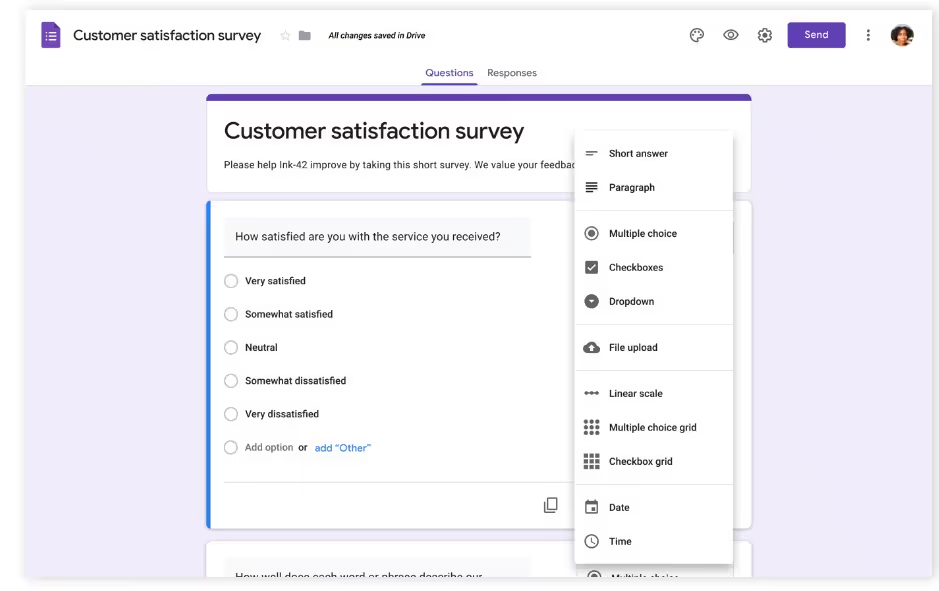
Pricing
- Personal use (free)
- Business Standard ($12/user/month)
Visit Google Form's pricing page to learn more about the features available for each plan.
2. SurveyMonkey
SurveyMonkey is a popular survey software platform that lets you send unlimited surveys with collaborative tools and features.
If you’re just getting started with surveys and don’t know how to format your surveys, SurveyMonkey also provides hundreds of free survey templates to help you start collecting feedback in minutes.
Some sample templates include:
- Management performance surveys
- Website feedback surveys
- Net Promoter Score (NPS) surveys
Here's a quick video tutorial on how to start creating surveys within SurveyMonkey:
Looking to recruit participants for your SurveyMonkey surveys? Enjoy the ease of recruiting participants through User Interviews’ Recruit panel, a pool of more than 2.1 million participants, and create surveys for your participants using SurveyMonkey. Simply connect your SurveyMonkey account to your User Interviews account to enable a simple end-to-end study workflow.
👉Visit our support page to learn more why (and how) to use SurveyMonkey and User Interviews together.
Pricing
- Basic (free)
- Individual Advantage ($39)
- Team Advantage ($25)
Visit SurveyMonkey's pricing page here to learn more!
3. Typeform
Typeform is another online survey tool that helps you create conversational, one question at a time style surveys. The simple interface is designed to engage your audience and serves as a great fit for teams looking for visually beautiful, easy-to-build forms, surveys, and quizzes.
Watch this quick video on how to start creating surveys on Typeform:
Looking for a complete end-to-end study workflow? Take advantage of User Interviews’ integration with Typeform. By connecting your Typeform account to UI, you can recruit and manage participants with User Interviews, link out to your survey on Typeform, and enjoy hands-off activity tracking across the two tools. Learn more about the integration here.
Pricing
- Basic ($25/month)
- Plus ($50/month)
- Business ($83/month)
Take a closer look at the pricing plans and features at Typeform's pricing page here.
4. Jotform
Whether you’re selling a product, accepting a fee, or collecting a donation, Jotform allows you to get paid directly through your form. Using their form builder, you can create and publish online forms for any of your survey needs— without the need to code.
Jotform’s forms use conditional logic, accept payments, generate reports, and automate workflows. What’s more, you can integrate your form with business apps like marketing services, project management boards, CRMs, cloud storage apps, and more. Choose from 150+ integrations available with this survey tool here.
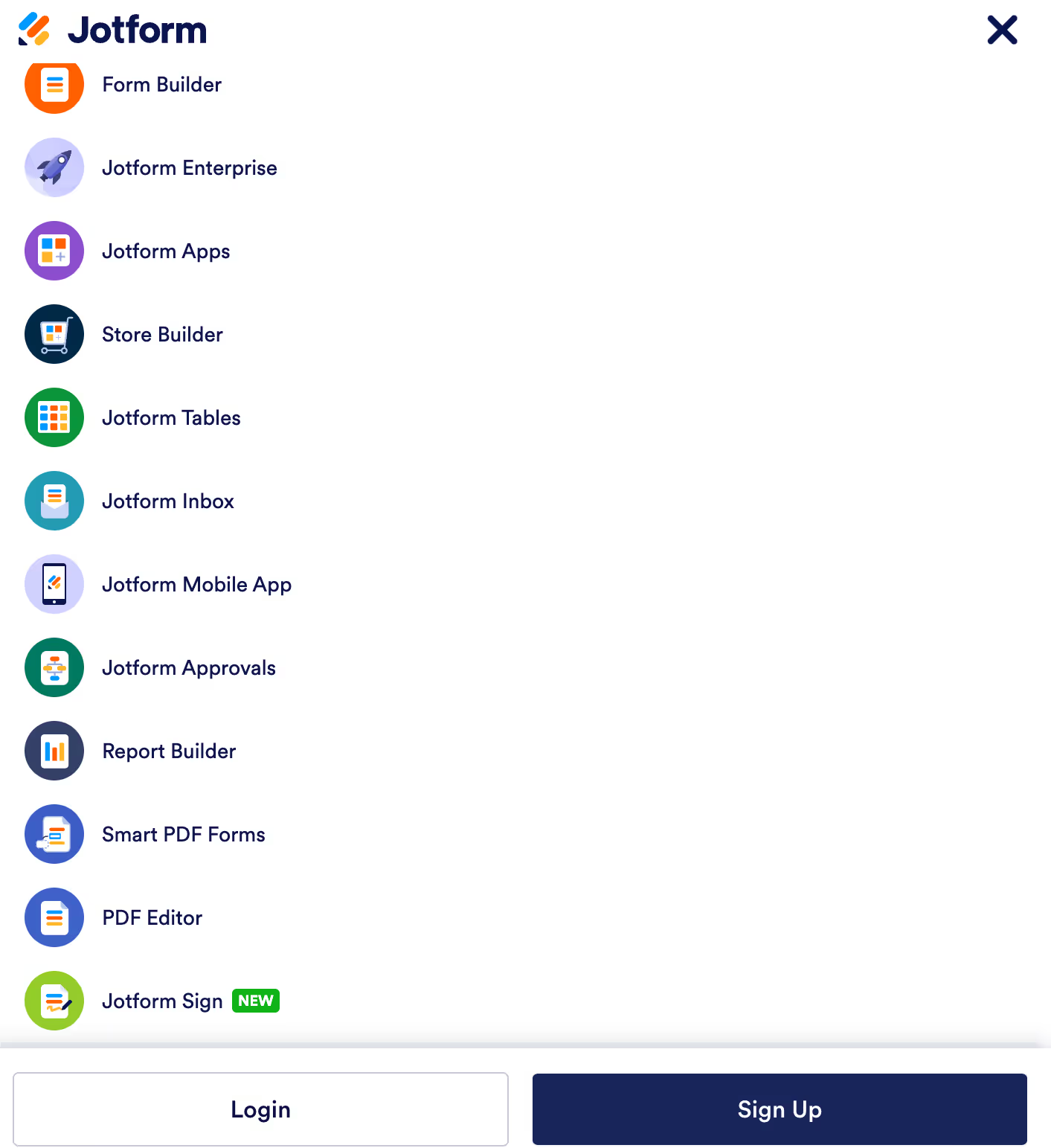
Pricing
- Starter (free)
- Bronze ($34/month)
- Silver ($39/month)
- Gold ($99/month)
Visit Jotform's pricing page to explore your plan options!
5. Qualtrics
Qualtrics is a comprehensive operating system for experience management. You can conduct easy market research with over 250 templates to make data driven decisions. With Qualtrics XM, you can use their free survey maker to create, distribute, and analyze surveys in minutes. Gather up to 500 responses and choose from eight question types to create your survey.
Whether you want to simply talk to your customers or uncover insights about your brand and product, Qualtrics’ flexible survey solution allows you to create your survey from scratch or choose from 50+ survey templates designed by industry experts.
At User Interviews, we believe in making the end-to-end study workflow simple and easy. That’s why we recently released an integration with Qualtrics to run surveys while recruiting with User Interviews. This integration makes it easy to build sophisticated surveys within Qualtrics, target high-quality participants (or your own customer segments) with User Interviews, then automate participant tracking across the two tools.
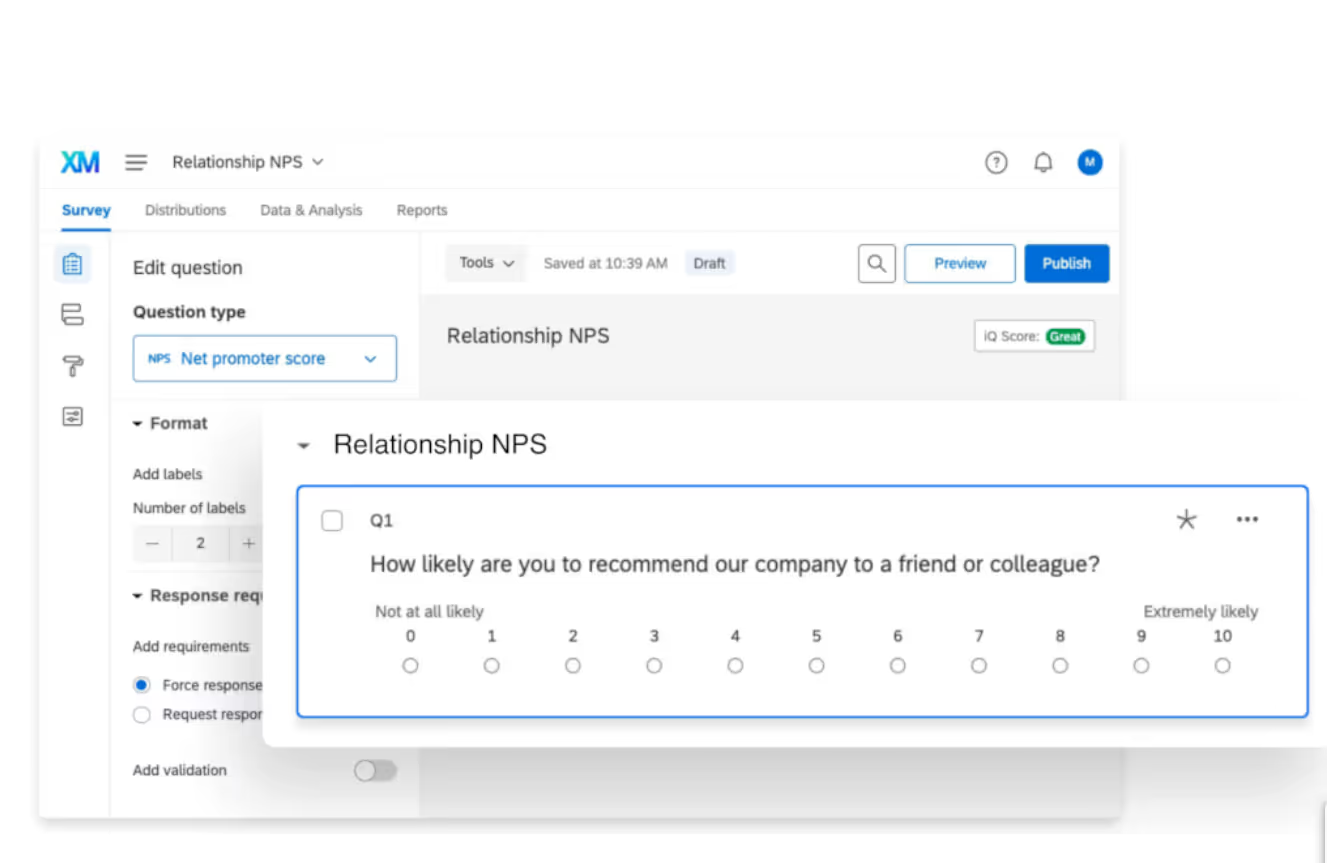
Pricing
Start a free trial or request pricing information here.
6. Hubble
Hubble is an all-in-one user research tool to collect user insights in every step of product development, offering in-product research, unmoderated research, and participant recruitment tools. With the ability to collect contextual feedback from your product users, you're able to increase the quality and velocity of your feedback collection, an increasing the chances of higher response rates.
Pricing
Hubble offers Pro and Organization plans, while freelancers and students can access the platform for free. More information on pricing can be found on their website.
7. Alchemer
Alchemer is an enterprise online survey software that’s considered a “powerful and cost-effective alternative to Qualtrics and SurveyMonkey.” This online survey solution was formerly known as SurveyGizmo and has been delivering survey and feedback software to organizations around the world for more than 16 years.
If you’re looking for more unique features than SurveyMonkey and lower expenses and complexity than Qualtrics, Alchemer is a great alternative survey software. The silver lining of Alchemer is that you can build and run surveys without per-response charges and take advantage of their intuitive data analysis tools to take action on feedback.
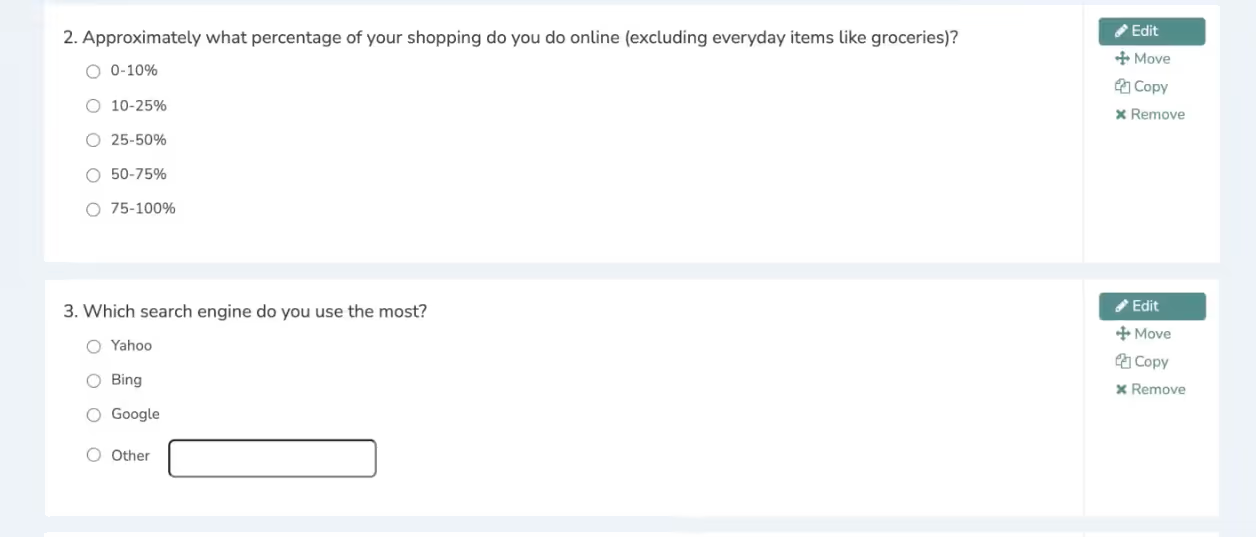
Pricing
- Collaborator plan for individuals ($49 per user/per month)
- Professional plan for teams of 1-3 ($149 per user/per month)
- Full access plan ($249 per user/per month)
View their detailed pricing page here.
8. Survey Legend
Make beautiful surveys, forms and free polls with SurveyLegend. Thousands of companies like Adidas, Netflix, Redbull, and Coca-Cola use SurveyLegend for their custom survey features. Here’s a quick rundown of the features you can access with SurveyLegend:
- Survey creation tools
- Text-based, choice-based, media-based, and field answer types
- Question customization
- Logic and branching tools
- Survey design tools
- Data and response collection
- Data analytics
- And more!
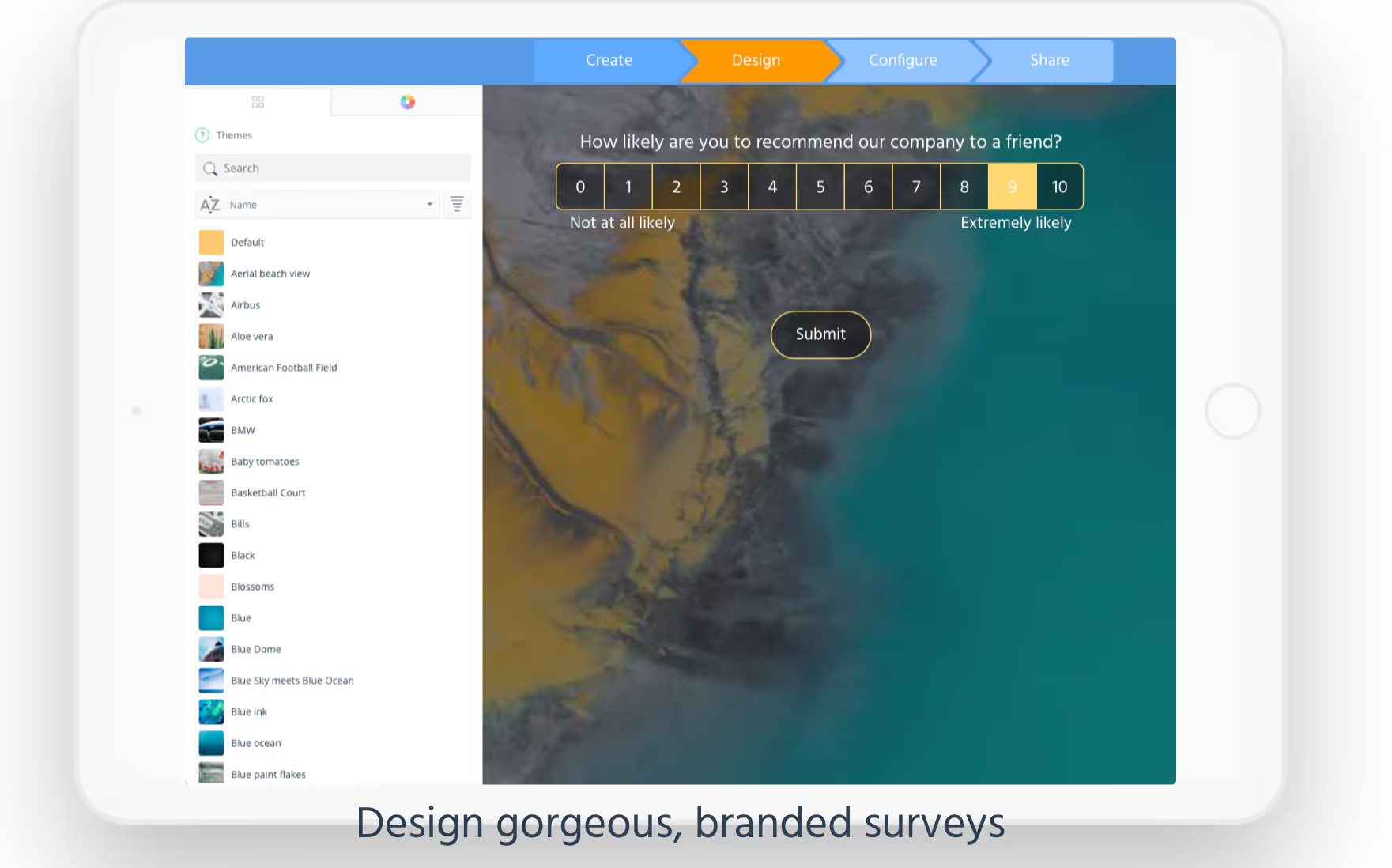
Pricing
Pricing starts with a free starter plan but they also offer:
- Pro plan ($15/month)
- Business plan ($25/month)
- Legendary plan ($65/month)
9. QuestionPro
Whether you’re a beginner or an enterprise looking for survey software, QuestionPro is “designed to help you make better business decisions.” You can create, distribute, and analyze online surveys, polls, forms, and quizzes. QuestionPro’s suite of survey solutions includes a research suite, customer experience platform, a workforce platform, and an academic platform.
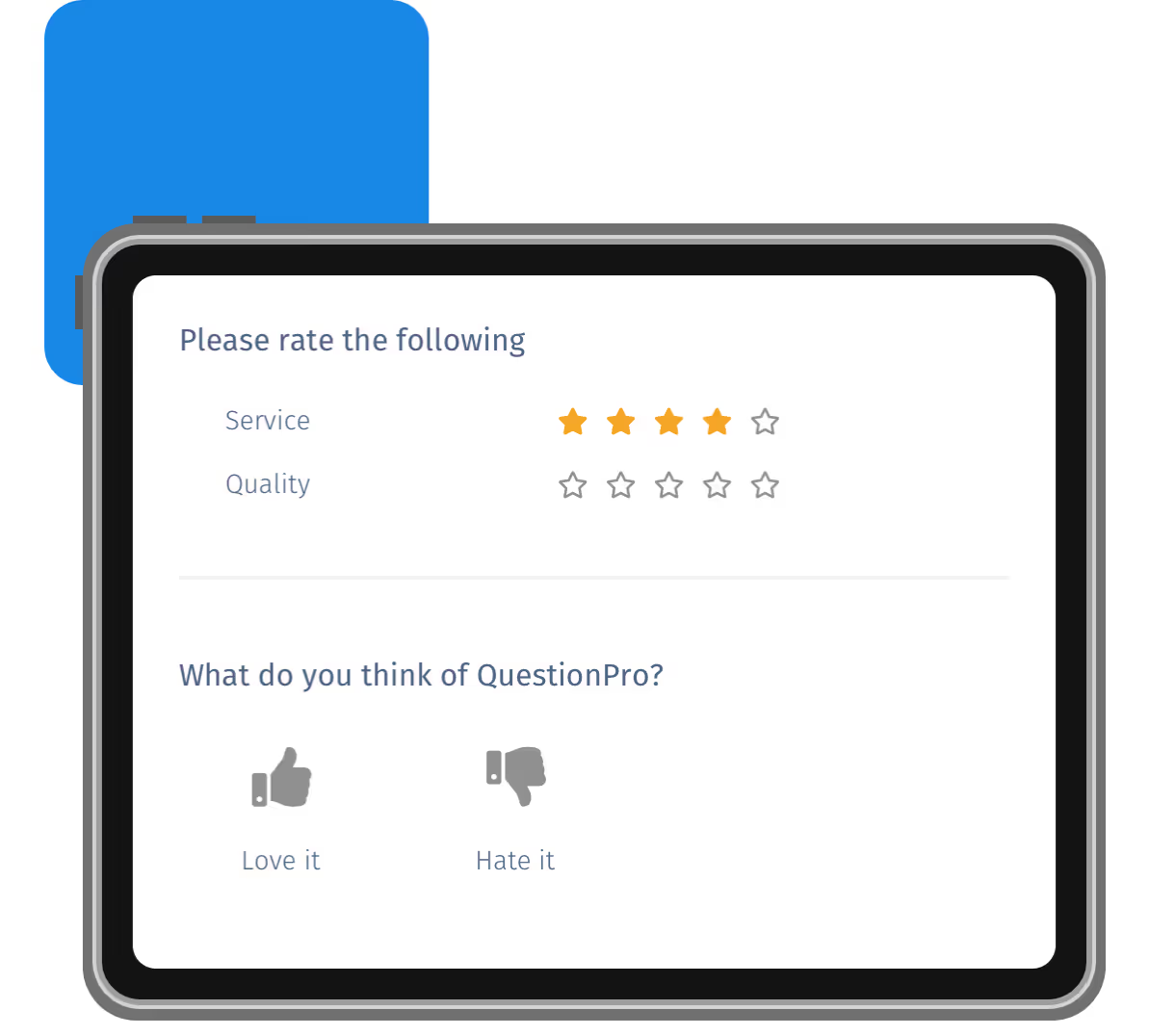
Pricing
Pricing for QuestionPro plans starts with a free plan but also offers:
- Advanced plan ($99/month)
- Team edition plan (custom pricing)
10. SurveySparrow
Using SurveySparrow, you can build conversational surveys of any type, for any purpose, in any language. According to their website, you can “get 40% more responses” using SurveySparrow. Whether you’re looking to optimize the customer experience, product experience, or the employee experience, you can create survey forms to help you uncover insights at every touch-point.
Here are some of their survey features:
- No-code chatbots
- 500+ survey templates
- Case management for support tickets
Watch this introductory video to SurveySparrow's intuitive survey features to learn more:
Pricing
SurveySparrow offers free trials for both their Enterprise and Business plans. Once the free trial is over the plan pricing as as follows:
- Business plan $99/month
- Enterprise plan for $499/month
- Elite plan with custom pricing
11. Block Survey
Looking for a survey solution focused on data and privacy? BlockSurvey is an end-to-end encrypted platform that keeps your data safe. This platform is privacy-focused and emphasizes their “no ads, no trackers” offerings.
BlockSurvey’s name literally means “survey on the blockchain.” The unique thing about BlockSurvey is that it allows digital rights such as data protection and identity ownership for surveys on the blockchain.
The online survey space may be flooded with software options, but BlockSurvey gives you and your participants peace of mind about sensitive information and how to protect that data.
Watch this short video about how BlockSurvey can help keep your survey data safe and sound:
Pricing
BlockSurvey offers several different pricing options according to your needs:
- Essential plan $12/month
- Standard plan $25/month
- Premium plan $45/month
- Team plan with custom pricing
12. CheckMarket
CheckMarket might seem like the typical survey software, but it stands out from other platforms because of its unique pricing model. They offer a flexible, commitment-free monthly pricing plan in which you simply pay for the number of survey responses you need, rather than paying for a set number of survey responses every month.
Within the CheckMarket platform, you can use their intuitive survey builder to create and edit surveys in a matter of minutes, either from scratch or using one of their templates. Not only does the platform help you create surveys, you can also distribute your surveys via multiple channels and generate reports with real-time feedback.
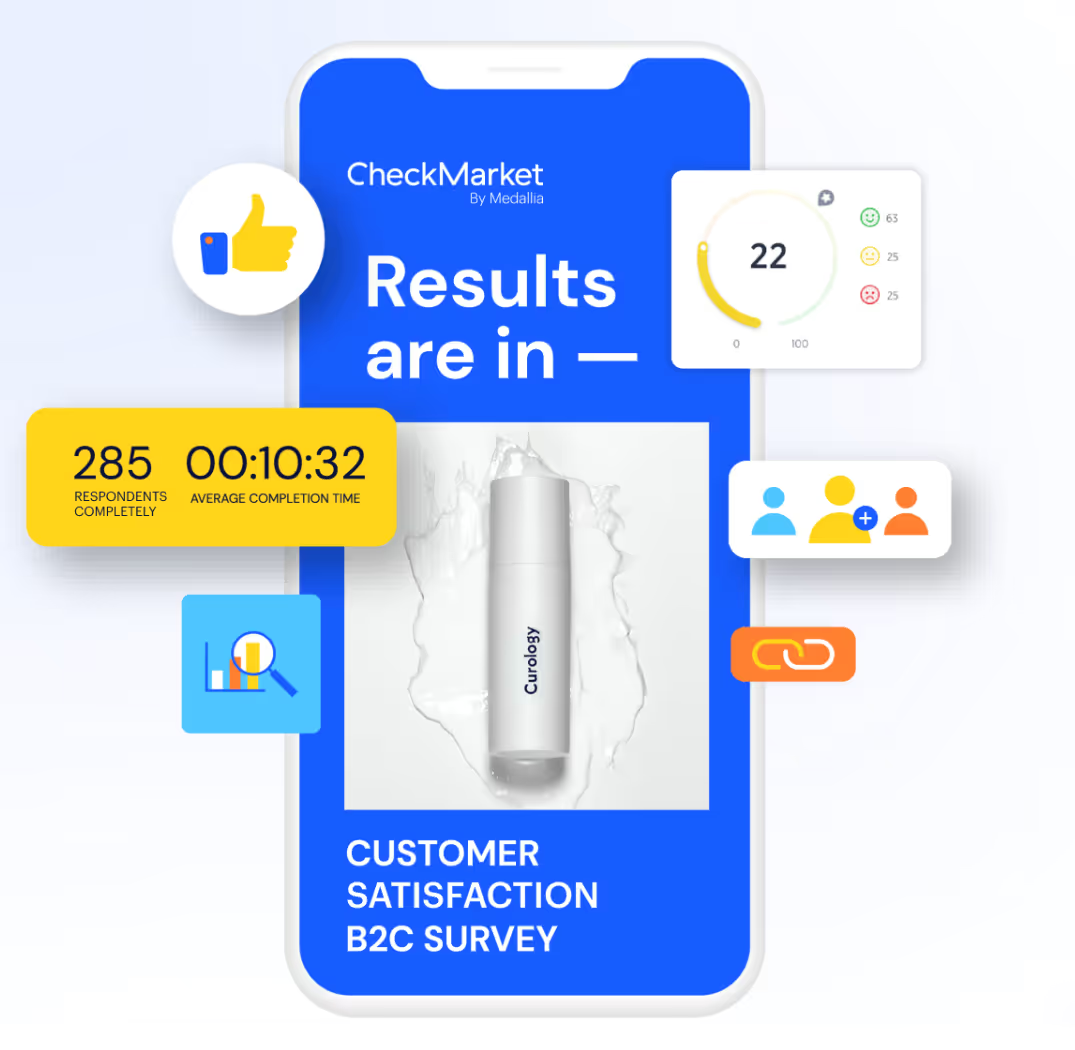
Pricing
CheckMarket’s pricing starts with a Forever Free plan but also offers:
- Professional plan $75/month
- Advanced plan $150/month
Visit their pricing page to learn more.
Not convinced? Visit CheckMarket’s website and learn the 10 reasons why you should choose CheckMarket.
13. Centiment
Centiment is a tool that offers a variety of features beyond survey creation. This platform really focuses on providing an end-to-end research workflow, starting with their audience panel of consumer and B2B survey respondents in 100+ countries. You can pair their built-in survey tool with their pool of participants, or you can collect your responses using any major survey tool.
In addition, they provide research support and services at every step of the way. Whether you need help drafting your survey or analyzing your data, Centiment research professionals can help guide you in the right direction.
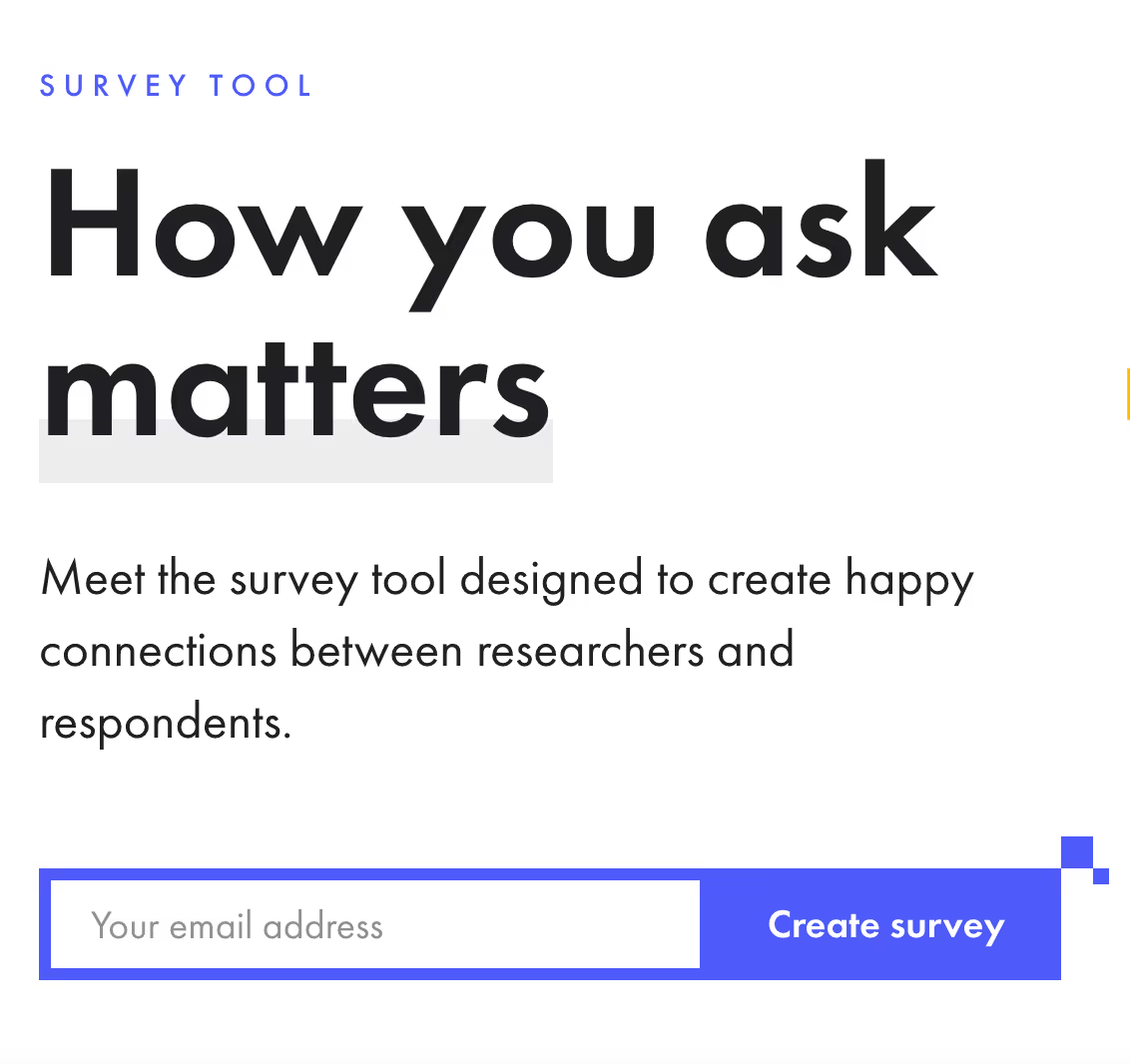
Pricing
Centiment offers:
- Essentials plan $59/month
- Professional plan $99/month
Learn more about their plans here.
14. UXtweak
UXtweak is a UX research tool that provides a whole suite of features, including a customizable survey builder. You can enrich your surveys with website or product design images, screening questions to segment respondents, and several language localization options. Choose from a wide selection of question types to get all the answers you need.
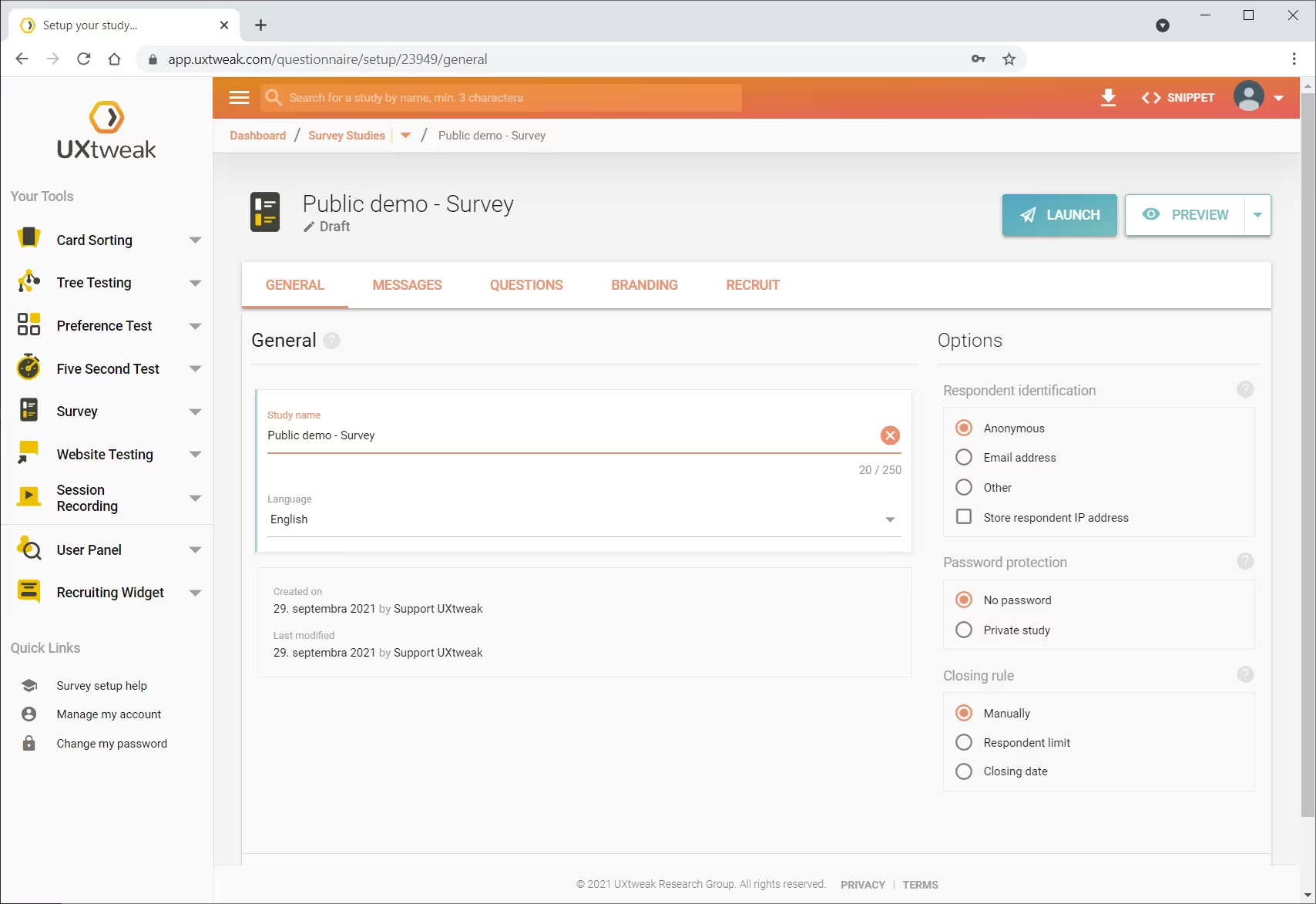
Pricing
You can start building surveys with a free UXtweak account.
They also offer:
- A business plan starting at $144/month
- An enterprise plan with custom pricing
Learn more about UXtweak’s pricing.
15. Corus
The Corus platform allows you to design, distribute, analyze, and share your surveys. If you’re looking for a great survey software alternative that has all of the features you need, Corus is a great option. You can easily create surveys with their drag-and-drop functionality, tag team members in a shared workspace, and even create intuitive data visualizations.
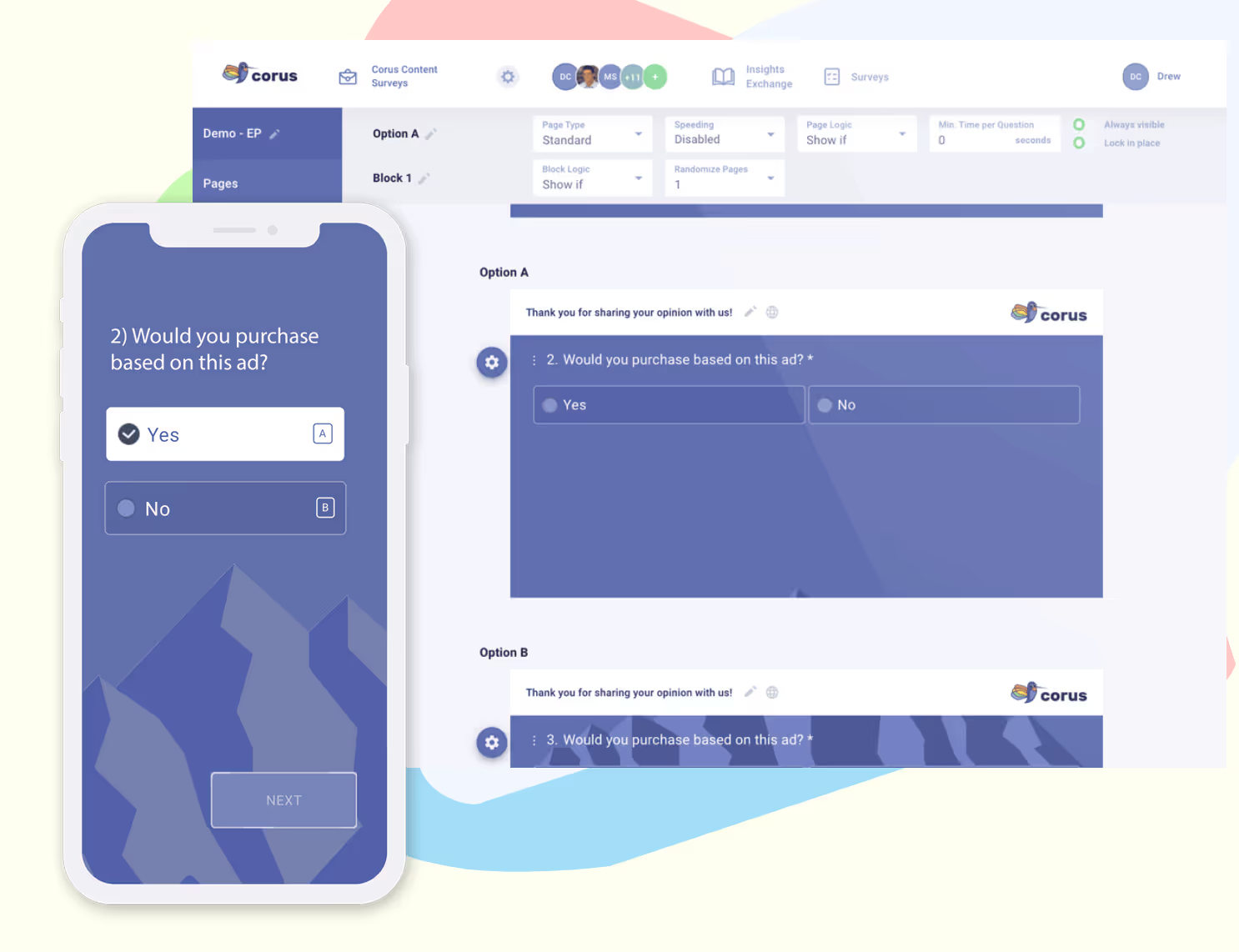
Pricing
It’s free to try, but they also offer:
- Professional plan $100/month
- Enterprise plan with custom pricing
These upgraded plan offers more licenses, preferred data pricing, and more. Learn more here.
16. Lyssna
According to its website, Lyssna offers two types of surveys: these are called Design surveys and Questions in the test builder. Design surveys are suitable when you want to ask questions about a creative asset like an image, video, or some audio. Questions can be used to create text-based surveys, for example a customer experience survey.
Pricing
Lyssna is free to try, but also offers a range of plans, from starter to enterprise. Learn more here.
Looking for other tools that offer more than just survey functionality?
There are many feature-packed UXR tools that include survey features and more for a complete end-to-end research workflow. Some of our favorite tools that offer features beyond surveys include Confirmit, Suzy, SightX, Optimal Workshop, Useberry, UXTweak, UserZoom and more.
Explore each tool and see which one suits your survey needs. Every survey tool is different and offers various levels of customization and features depending on what you’re looking for. Our recommendation? Mix and match some tools to see which one serves you best.
💍 Can one tool rule them all? Explore the differences between all-in-one UX research tools and integrated, best-in-class tech stacks.
Create better surveys with better tools and writing tips
Better tools + better writing = better surveys.
The more resources you have, the more confident you’ll become in your survey creating skills. After you’ve explored different survey tools and figured out the best ones for your needs, the next step is to sharpen your survey writing skills!
Survey tools are great stepping stones to streamlining your survey workflow, but the quality of your survey relies heavily on your survey writing. That’s why we’re here to empower you with the right resources and knowledge to guide you in the right direction. Check out our survey writing best practices guide and grab your own copy of our survey QA checklists to help you optimize your survey writing!
Looking for more than a simple survey tool? User Interviews is the fastest and easiest way to recruit and manage participants for research. Get insights from any niche within our pool of over 1.5 million participants with Recruit, or build and manage your own panel with Research Hub. Visit the pricing page to get started.



















